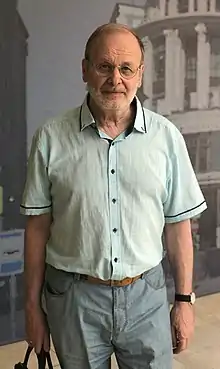Vladimir Popov (mathematician)
Vladimir Leonidovich Popov (Russian: Влади́мир Леони́дович Попо́в; born 3 September 1946) is a Russian mathematician working in the invariant theory and the theory of transformation groups.[1]
Vladimir Leonidovich Popov | |
|---|---|
 | |
| Born | 3 September 1946 Moscow |
| Nationality | Russian |
| Academic career | |
| Field | Mathematics |
| Information at IDEAS / RePEc | |
Education and career
In 1969 he graduated from the Faculty of Mechanics and Mathematics of Moscow State University. In 1972 he received his Candidate of Sciences degree (PhD) with thesis Стабильность действия алгебраических групп и арифметика квазиоднородных многообразий (Stability of the action of algebraic groups and the arithmetic of quasi-homogeneous varieties). In 1984 he received his Russian Doctor of Sciences degree (habilitation) with thesis Группы, образующие, сизигии и орбиты в теории инвариантов (Groups, generators, syzygies and orbits in the theory of invariants).[2]
He is a member of the Steklov Institute of Mathematics and a professor of the National Research University – Higher School of Economics.[1] In 1986, he was an invited speaker at the International Congress of Mathematicians (Berkeley, USA),[3] and in 2008–2010 he was a core member of the panel for Section 2, "Algebra" of the Program Committee for the 2010 International Congress of Mathematicians (Hyderabad, India).[4]
In 1987 he published a proof of a conjecture of Claudio Procesi and Hanspeter Kraft.[5] In 2006, with Nicole Lemire and Zinovy Reichstein, Popov published a solution to a problem posed by Domingo Luna in 1973.[6]
Awards
In 2012, he was elected a member of the inaugural class of Fellows of the American Mathematical Society[7] which recognizes mathematicians who have made significant contributions to the field.
In 2016, he was elected a corresponding member of the Russian Academy of Sciences.
Books
- Popov, Vladimir L. (1982). Discrete complex reflection groups. Utrecht: Communications of the Mathematical Institute Rijksuniversiteit Utrecht, Vol. 15.
- Popov, Vladimir L. (1992). Groups, generators, syzygies, and orbits in invariant theory. Providence RI: Translations of Mathematical Monographs, Vol. 100, Providence RI: Amer. Math. Soc. ISBN 0-8218-4557-8.[8]
- Popov, V. L.; Vinberg, E. B. (1994). "Invariant Theory". Algebraic Geometry IV. Encyclopaedia of Mathematical Sciences. Vol. 55. Berlin; Heidelberg: Springer. pp. 123–278. doi:10.1007/978-3-662-03073-8_2. ISBN 978-3-642-08119-4.
- Popov, Vladimir L. (2004). Algebraic transformation groups and algebraic varieties: proceedings of the conference Interesting algebraic varieties arising in algebraic transformation group theory held at the Erwin Schrödinger Institute, Vienna, October 22-26, 2001. Berlin New York: Springer. ISBN 9783540208389.
References
- "Попов Владимир Леонидович". math-net.ru.
- "Vladimir Popov". HSE University.
- Popov, V. L. "Modern developments in invariant theory" (PDF). In: Proc. Intern. Congr. Math. Berkley, California. 1986. Vol. 1. pp. 394–406.
- "Popov Vladimir Leonidovich". All-Russian Mathematical Portal. Retrieved 28 August 2016.
- Popov, V L (1987). "Contraction of the actions of reductive algebraic groups". Mathematics of the USSR-Sbornik. 58 (2): 311–335. doi:10.1070/SM1987v058n02ABEH003106. ISSN 0025-5734.
- Lemire, Nicole; Popov, Vladimir L.; Reichstein, Zinovy (2006). "Cayley groups". Journal of the American Mathematical Society. 19 (4): 921–967. doi:10.1090/S0894-0347-06-00522-4. S2CID 9987646.
- List of Fellows of the American Mathematical Society, retrieved 16 November 2013.
- Schwarz, Gerald W. (1993). "Book Review: Groups, generators, syzygies, and orbits in invariant theory". Bulletin of the American Mathematical Society. 29 (2): 299–305. doi:10.1090/S0273-0979-1993-00433-6.
External links
- Personal profile: Vladimir Leonidovich Popov Steklov Institute of Mathematics